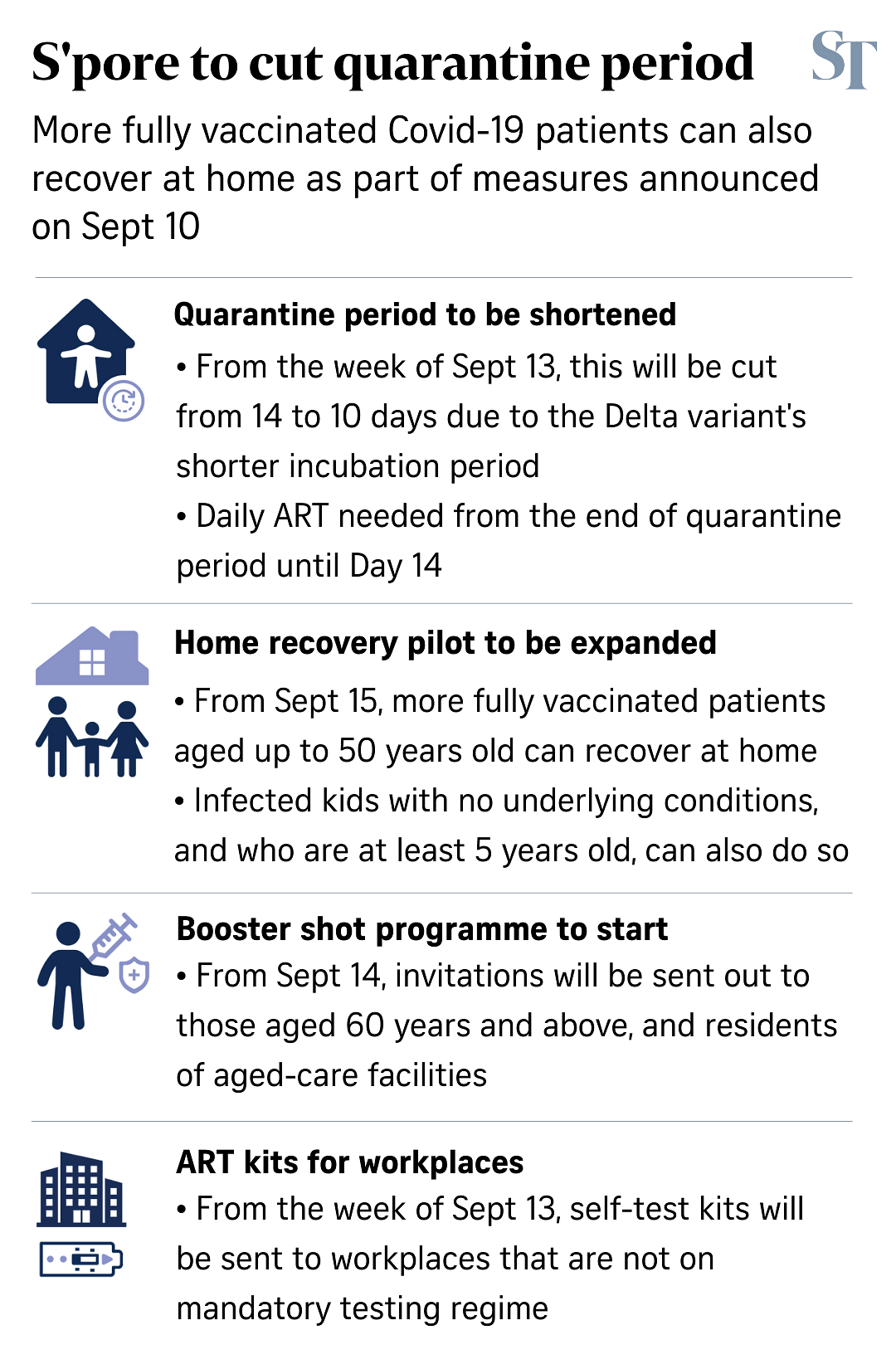More Covid-19 patients can recover at home, shorter quarantine: New measures at a glance
SINGAPORE - Recovering at home will be the default mode of care for more fully vaccinated Covid-19 patients from next Wednesday (Sept 15).
This is among the measures being taken to ensure that Singapore's healthcare system can cope with the current level of infections, which has increased in recent weeks.
The Ministry of Health (MOH) on Friday noted that the number of daily cases reported has risen from an average of 76 cases a fortnight ago to 288 cases in the past week. This is expected to rise to more than 1,000 cases a day soon due to intensified testing.
Here are the key announcements from a press conference by the multi-ministry task force on Covid-19 on Friday.
1. Updated treatment protocol

A home recovery programme for fully vaccinated people will be expanded from Sept 15. It will be extended to people aged 50 or younger who have no significant underlying illnesses.
Children with Covid-19 who are at least five years old and do not have any underlying illnesses can also recover at home now. They must be assessed by the hospital to be fit for home recovery.
The pilot, first announced on Aug 19, is meant for Covid-19 patients with mild or no symptoms who can be isolated from the rest of the household.
The programme - with 21 patients so far - has shown positive results, said MOH.
Such patients and their household members must meet certain conditions. For instance, everyone in the home must be fully vaccinated and must not belong to any vulnerable groups, such as pregnant women, the elderly or the immunocompromised.
Since Tuesday (Sept 7), MOH has also reduced the isolation period for fully vaccinated Covid-19 cases.
They can be as early as seven days into their illness if they have undetectable or very low viral loads, showing that they are non-infectious.
Unvaccinated patients will continue to be discharged from 14 days into their illness.
ince Tuesday (Sept 7), MOH has also reduced the isolation period for fully vaccinated Covid-19 cases.
They can be as early as seven days into their illness if they have undetectable or very low viral loads, showing that they are non-infectious.
Unvaccinated patients will continue to be discharged from 14 days into their illness.
2. Shorter quarantine period

From next week, the current quarantine period of 14 days - which accounts for the maximum Covid-19 incubation period - will be reduced to 10.
This is provided that the person under quarantine tests negative at the end of the period. He also needs to take an antigen rapid test daily until day 14.
The reduction is because the Delta variant has a shorter incubation period - an average of under four days compared with an average of six for the original strain.
This means it will take an average of four days after exposure to the virus for it to be detectable.
READ FULL STORY: Covid-19 quarantine period cut to 10 days due to Delta variant's shorter incubation
3. Booster shot programme to start next week

From next Tuesday, seniors aged 60 years and above and residents of aged-care facilities will be invited to sign up for their booster dose of an mRNA vaccine.
This is provided they have completed their two-dose vaccination regimen at least six months ago.
Those who are moderately to severely immunocompromised are also included, added MOH. This group should consult their treating specialists before receiving their third doses.
READ FULL STORY: Seniors to be invited to register for Covid-19 vaccine booster shots from Sept 14





No comments
Share your thoughts! Tell us your name and class for a gift (: